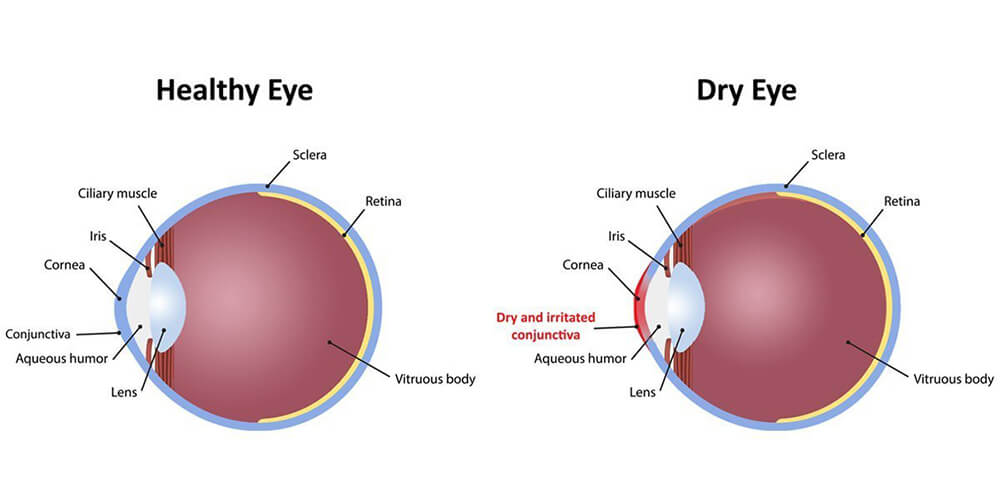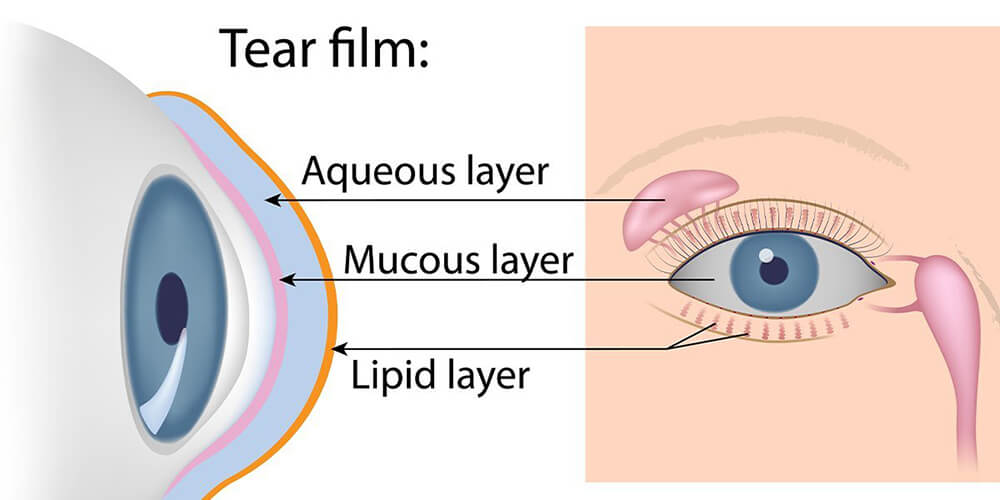Dry Eyes
Posted by: Invision Optometry in Category Dry Eye Management

Dry eyes occur when tears cannot provide the adequate moisture that our eyes need. It is a condition in which an insufficient amount of quality tears are produced to lubricate and nourish the eye. Tears are essential for maintaining eye health and providing clear vision. Or put simply, to function normally, the cornea must be covered at all times by a coating of tears. When the eye does not produce tears properly, or when the tears are not of the correct consistency and evaporate too quickly, the condition is referred to as dry eye syndrome. While dry eyes are very common, it is important to understand the condition should not be left untreated.
Why Tears are so important…
Eyes, Tears, & the Cornea
Tears are essential to eye health, because they nourish and protect the cornea. The cornea is the clear outer surface that covers the colored part of the eye. It helps protect the eyes from germs, dust, and other harmful matter. The cornea accounts for most of the eye’s focusing power, and serves as a filter to screen out most of the damaging UV rays in sunlight. However, the cornea alone does not have the ability to nourish or protect the eye against infection. As a result, the cornea relies on tears to receive its nourishment. Therefore, tears are as important to the eyes as oxygen is to the lungs.
Symptoms of Dry Eyes…
Dry Eye Symptoms
Dry eye symptoms can vary widely from person to person. People with dry eyes may experience irritated, gritty, scratchy or burning sensations in the eyes. One way to describe a common symptom is the feeling that something is in your eye. This condition can be mild or severe, and its symptoms can appear either suddenly, or gradually. In addition to being uncomfortable, dry eyes can result in a decreased tolerance of reading, working on the computer, or any activity that requires sustained visual attention. Here are a few of the symptoms most commonly associated with dry eyes.


Symptoms of Dry Eye:
- Excessive tearing
- Gritty or sandy feeling in the eyes
- Eye pain
- Eye fatigue
- Redness
- Itchy eyes
- A stringy discharge from the eye
- Discomfort
- Eye pain
Causes of Dry Eyes…
What Causes Dry Eyes
Dry eyes can develop for many reasons. While aging individuals frequently experience dryness of the eyes, dry eye can occur at any age. People tend to make fewer tears, as they grow older due to hormonal changes. However, dry eye syndrome can occur at any age impacting both men and women. There are a number of factors that can increase the risk of dry eyes.
A Few Factors Associated with Dry Eyes:
- Aging: While dry eye can occur at any age, it becomes increasingly more common later in life
- Computer Use: While working at a computer for long periods of time we tend to blink less frequently leading to greater tear evaporation
- Menopause: Post-menopausal women are at greater risk of dry eyes
- Environment: Both indoor and outdoor environments can cause dry eye symptoms (decreased indoor humidity, or dry windy conditions outdoors to name a few)
- Health Conditions: Certain systemic diseases such as lupus, diabetes, thyroid-associated diseases, rheumatoid arthritis and Sjogren’s syndrome contribute to dry eye problems
- Medications: Antihistamines, antidepressants, and certain blood pressure medications can increase the risk of dry eye symptoms
- Eyelid Issues: Incomplete closure of the eyelids when blinking or sleeping can cause severe dry eyes
How to Know if you have Dry Eyes…
Testing for Dry Eyes
The only way to determine if you have dry eyes is to have your eye doctor perform a dry eye test during your eye exam. Symptoms alone cannot predict the presence or severity of dry eye syndrome. The reality is, symptoms can vary greatly from person to person. Some individuals may experience mild dry eye symptoms that seem like more of a nuisance. While others may experience dry eye symptoms that are so significant, that it is necessary to see an eye doctor. Whether you are experiencing mild or severe dry eye symptoms, it makes sense to see your eye doctor. Only a careful examination of your eyes can reveal the presence and severity of dry eye syndrome.
There are Effective Treatment Options if you Suffer from Dry Eyes…
Dry Eye Treatment
Thankfully, there are effective treatment options if you suffer from dry eyes. During an eye exam, we can determine the best treatment to keep your eyes healthy and comfortable. Contact us today to book an eye exam, or call us at (619) 222-2020 to learn more about how we can treat dry eyes.


